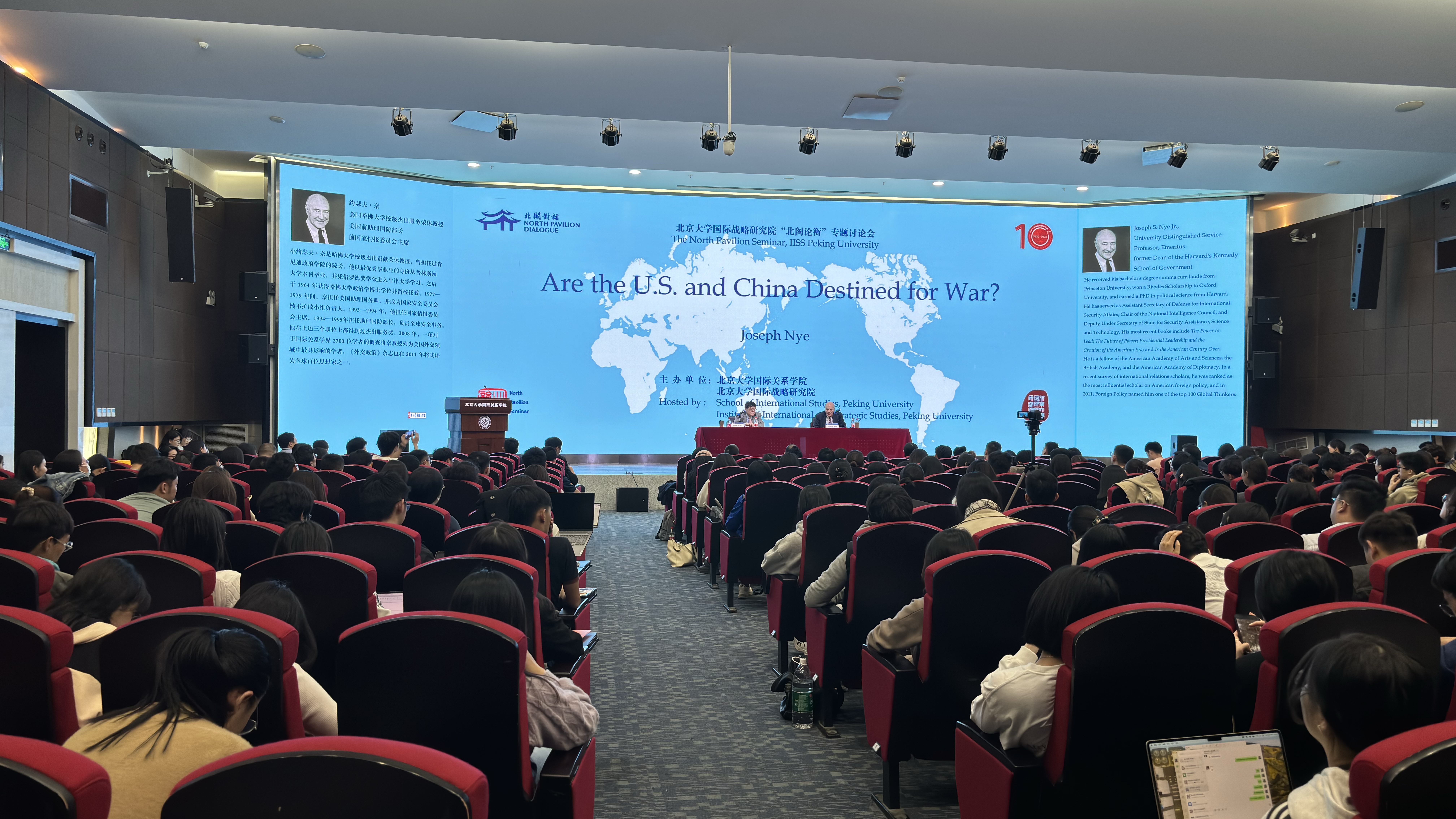Lecture | Joseph Nye: The U.S. and China are NOT destined for war
Oct 26, 2023
During a lecture at Peking University, Joseph Nye explained why the U.S. and China are not destined for war and why decoupling is unlikely to happen.
Peking University, October 26, 2023: In early 2017, Graham Allison, the eminent American political scientist who coined the catchphrase "Thucydides's Trap" to delineate a U.S.-China conflict, published his book Destined for War (HMH). His hypothesis came out at a time when a cascade of crises, ranging from trade to foreign affairs, was emerging or brewing.
Roughly six and a half years later, donkey's years in the scope of history, Joseph Nye, Allison’s long-time friend and colleague at Harvard, posed the topic of "destined for war" again, during a lecture at Peking University’s School of International Studies on Oct. 25 – but this time with a question mark.
At the outset of his lecture titled "Are the U.S. and China Destined for War?" Prof. Nye straightforwardly told a crowded audience in PKU’s Qiulin Lecture Hall, "I can answer the question in advance, which is I think the answer is no."
In his one-hour-long lecture, Prof. Nye, the Emeritus and former Dean of Harvard's Kennedy School of Government and former Assistant Secretary of Defense for International Security Affairs of the U.S., explained why he was convinced that war between the world's two largest economies isn’t bound to happen, as he debunked the war-related analogies that have in recent years gained popularity in the West.
Prof. Nye’s reasoning was at once lucid and cogent: Neither the Peloponnesian War (between Athens and Sparta), upon which Thucydides's Trap had drawn, nor the Cold War (between the U.S. and the Soviet Union), Nye highlighted, could analogize the current U.S.-China relations, which are so economically, socially, and ecologically interdependent that war or “decoupling” will be a “catastrophe” for both sides and the world at large.
In the Cold War period, Prof. Nye explained, there was “no economic interdependence and very little social contact” between the U.S. and the Soviet Union. “In that sense, the U.S.-China relationship is totally different,” Nye said, “There is economic [interdependence] between the U.S. and China; and in terms of social contacts … there’re tens of thousands of Chinese students in American universities.”
“In addition to the economic interdependence between the U.S. and China, there is another type of interaction that is different from the Cold War period, which is the ecological interdependence,” Prof. Nye added. Nye deemed that ecological interdependence, which he described as transnational causes, ones that affect the international community as a whole, including climate change and global pandemics, calls for cooperation rather than playing politics.
When expanding on the Peloponnesian War (431–404 B.C.), which Nye regarded as a prolonged war caused by serious miscalculation (of the duration of the conflict), Prof. Nye opined that the Peloponnesian War analogy and the Cold War metaphor “are mental traps for us.” Nye suggested that a more proper historical analogy would be the "pre-war Europe in 1914," an event of self-fulfilling prophesy that Prof. Nye cautioned against both in this lecture and in his previous writings.
In his lecture, Prof. Nye also examined the association between the "Cold War mentality" and the mindset of decoupling in the U.S.
For Nye, the decoupling of interdependence between the world’s two largest economies “makes no sense.” If the U.S. were really trying to achieve economic decoupling, the consequence “will be devastating to the US economy, to the Chinese economy, to the world economy,” Nye warned, adding, “So if you are talking about a new ‘cold war’ being solved by decoupling, you are making a huge mistake in policies.”
While branding the Peloponnesian War and the Cold War analogies inaccurate and dangerous, Prof. Nye offered several terms to frame the most important relations of the 21st century, including “managed strategic competition,” a phrase borrowed from former Australian Prime Minister Kevin Rudd, and “peaceful co-existence,” from Antony Blinken, U.S. Secretary of State.
Prof. Nye stressed that while cooperation and competition seem to be opposite sides, the U.S. and China have successfully managed the two dimensions simultaneously for a period of time in their relations, even in the so-called "great-power competition" cycle, as many in the U.S., including Prof. Nye himself, believe is where the relations now stand.“But what worries me is that too much emphasis is now on the competition side, not enough on the cooperation side,” he accentuated.
Nevertheless, Prof. Nye categorically reiterated, at the end of his lecture, that given the fact that the U.S. and China are economically, culturally, and ecologically interdependent and that “neither country poses an existential threat to the other (in history),” “My answer to the question (Are the U.S. and China Destined for War?) is no!” “Policies should be made to minimize the possibility of war,” he declared, “We can avoid it!”
In the Q&A session, Prof. Nye answered questions from the audience, which included the Taiwan question, the anti-Chinese rhetoric in Washington, and the U.S.-China-Japan relations. On the Taiwan question and the U.S.-China-Japan trilateral relations specifically, Prof. Nye stressed that “reaffirming the one-China (principle) is essential to the China-U.S.-Japan relations.”
Prof. Nye’s lecture was hosted by the School of International Studies and the Institute of International and Strategic Studies (IISS) at PKU and was moderated by Wang Jisi, the founding dean of the IISS, who, in his closing speech, expressed his gratitude to Prof. Nye and also encouraged students in the audience to “work hard to avoid conflict and catastrophe.” "(It is) a question for you to solve," Wang told the young students, “for a better future.”
* This lecture was featured in IISS's North Pavilion Seminar and North Pavilion Dialogue
* Opinion in this article does not reflect that of PKU News
Written and reported by: Dennis Meng
Photos by: Dennis Meng

